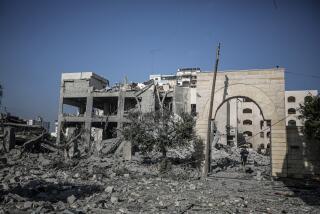ON SCIENCE / GULF WAR : Science / Medicine : Kuwaiti Center Struggles to Recover From Atrocities
- Share via
The burning oil fields of Kuwait and the multiple oil slicks in the Persian Gulf are stark reminders of perhaps the worst environmental disaster ever wrought by the hand of man. But the rubble-strewn remains of Kuwait’s museums, university campuses and radio and television facilities--whose video library was completely ravaged--also testify to the crushing of a culture.
The destruction was wanton, and it was purposeful--it was not merely the incidental consequence of war. The Iraqis, by their own admission, wanted to destroy nothing less than modern Kuwait itself--its past and its future. And nowhere was that sinister purpose more evident than in the gratuitous, yet pointed, destruction of the Kuwait Institute for Scientific Research (KISR).
According to witnesses, it was on the morning of Feb. 26 --two days into the allied ground offensive--that Iraqi tanks rolled up and started firing on KISR, the most prestigious facility of its kind in the Arab world. The $18-million, 4-year-old modern building was left a shambles and so was its noble purpose.
What happened that day was merely the final blow. During the preceding seven months, according to Kuwaiti scientists, KISR’s equipment was systematically looted. Its libraries were ransacked and left nearly empty. Its laboratories and offices were trashed, along with the stores of precious data they contained. And it was done, the scientists say, in full view of and with the cooperation of Iraqi scientists (whether they were coerced to cooperate is one of many unanswered questions).
As he walked through KISR’s shattered remains, Saed Akashah, a chemical engineer, wept for all that was lost--the IBM 3090 computer, the electron microscope, but especially the data, painstakingly accumulated for the past 23 years by hundreds of scientists from many countries, including, ironically, Iraq.
Altogether, there were 60 major research projects going on at the institute at the time of its takeover. Scientists were studying ways of growing vegetables in the desert, using satellites to find new sources of water, and controlling oil spills.
This was not an ivory tower. Its loss is not some obscure abstraction. KISR was dedicated to finding practical solutions to real-life problems, problems faced by people worldwide. And KISR was very active in the community, too--most recently having supplied Kuwaiti schools with computers, all of which were also destroyed.
“We are a wealthy country,” Akashah said, “and we wanted to use our wealth to develop our minds, not just our cities.” KISR, in his words, was Kuwait’s first major effort toward developing itself into “the Athens of the modern-day Arab world.”
As a scientist as well as a journalist, I view the looting and destruction of KISR as an intolerable attack on the rational by the irrational--one that requires further investigation and prosecution by the world scientific community. Already, the American Assn. for the Advancement of Science has committed its resources to conducting an investigation, and the results could come as early as this fall.
There are only a few things that distinguish us from other animals, and chief among them is our capacity to acquire and store knowledge about the world--and the universe--in which we live.
Like other scientists, I regard that capacity as particularly sacred.
KISR was more than a renowned scientific facility; it was a cultural institution--the pride and joy of the Kuwaiti people. The Iraqis were well aware of this. By destroying KISR, their intention was to drive a stake through Kuwaiti science, but also through Kuwaiti culture.
Did the Iraqis succeed? In the short run, yes. Current estimates are that it will take several years before Kuwaiti scientists can replace their institute and longer before they can recover at least some of their data. But in the long run, no. This assault on KISR is construed by many scientists as an intolerable attack on the entire scientific enterprise.
If anything, this single atrocity promises to elicit unprecedented worldwide support for Kuwaiti science and the cultural values that nurture it.
More to Read
Sign up for Essential California
The most important California stories and recommendations in your inbox every morning.
You may occasionally receive promotional content from the Los Angeles Times.










